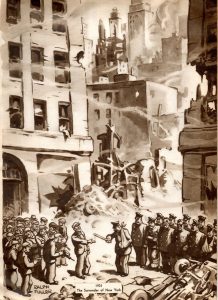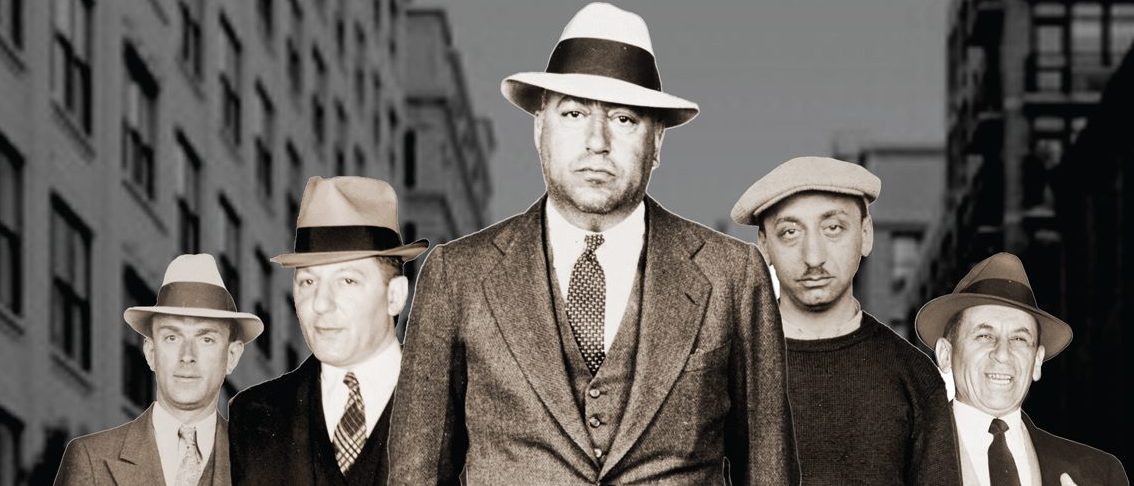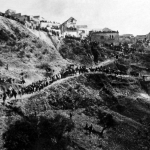New York’s Jewish gangsters lived fast and furious. Exploiting the criminal opportunities created by Prohibition, they masterminded a network of crime that spread far beyond New York and earned their fellow Jews’ scorn – and admiration
In 1919, the U.S. ratified a Constitutional amendment prohibiting the manufacture, sale, and transport of alcohol. The ban went into effect in 1920, and from then on it seemed that every American over age twelve had to have a drink. In one year, more than two hundred thousand unlicensed saloons, euphemistically called “speakeasies” and “blind pigs,” sprang up across the nation. The Prohibition era (1920–33) offered tough young hoodlums a chance to make big money. Consequently, large bootlegging organizations led by the lawless sons of Irish, Italian, and Jewish immigrants formed to quench America’s thirst – and rake in hundreds of millions of dollars.
Although Jews constituted less than four percent of the population, half of the major bootleggers were Jewish. Their business acumen, organizational ability, and ruthlessness allowed them to take advantage of the chaotic early days of Prohibition, when weak law enforcement provided endless opportunities for the unscrupulous.

New York City, then home to 1.6 million Jews, or forty-five percent of the nation’s Jewish population, spawned the greatest number of Jewish gangsters and crime bosses. The city also “supplied” them to other cities. Detroit’s notorious Purple Gang, for example, was led by the Bernstein brothers, transplanted New Yorkers.
The role of New York City’s Jews in organized crime has, not surprisingly, received less attention than the Jewish contribution to the arts, science, medicine, and journalism. Nevertheless, organized Jewish crime is an integral part of New York’s history, and to ignore it is to distort the Jewish experience of the city. Although several of New York’s Jewish gangsters achieved notoriety before World War I, Prohibition created undreamed-of opportunities for mobsters to gain national prominence and influence.
The Czar of the Underworld
The mastermind behind New York’s under-world was professional gambler Arnold Rothstein. Best known for allegedly rigging the 1919 baseball World Series, Rothstein pioneered organized crime in the United States. A man of remarkable energy, imagination, and intellect, he transformed petty larceny into big business. Rothstein was born into a wealthy Orthodox Jewish family but opted for an illegal path to fame and fortune. During the 1920s, he put together the largest gambling and bookmaking empire in the nation, launched a million-dollar stolen-bond business, and controlled most of New York’s gangs, narcotics traffic, bootlegging, and gambling, earning himself a reputation as “the Czar of the Underworld.” Writer Damon Runyon nicknamed him “the Brain” and used him as the model for Nathan Detroit, the main character in Guys and Dolls. F. Scott Fitzgerald also immortalized Rothstein, basing the gambler Meyer Wolfsheim in The Great Gatsby on him.

Rothstein mixed with politicians and statesmen as well as bankers and bums. His payroll boasted a rogues’ gallery of famous New York gangsters, including Jack “Legs” Diamond, Charlie “Lucky” Luciano, and Frank Costello, as well as Jewish undesirables such as Meyer “the Little Man” Lansky, Benjamin “Bugsy” Siegel, Louis “Lepke” Buchalter, Dutch Schultz (born Arthur Flegenheimer), and Waxey Gordon. Rothstein’s life of crime, for which he never spent a day in jail, ended abruptly when he was shot dead during a card game in 1928. He was forty-six. The renowned Orthodox rabbi Leo Jung delivered the eulogy at his funeral, which was conducted – out of respect for the deceased’s father – in full accordance with Jewish law.







